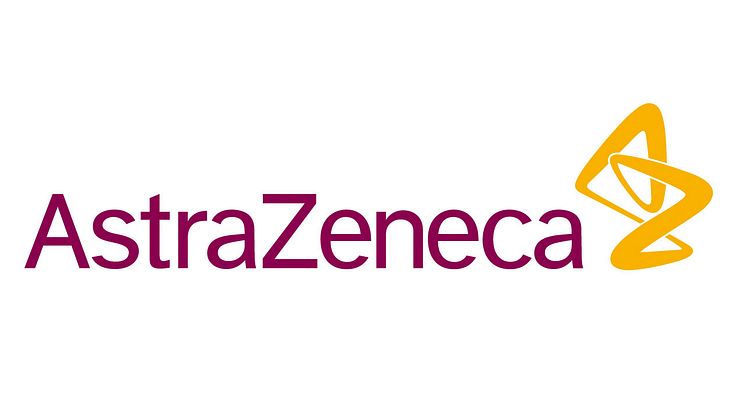
Pressmeddelande -
Lynparza recommended for approval in the EU by CHMP for BRCA-mutated metastatic castration-resistant prostate cancer
Only PARP inhibitor to improve overall survival vs. new hormonal agent treatments in advanced prostate cancer
AstraZeneca and MSD’s Lynparza (olaparib) has been recommended for marketing authorisation in the European Union (EU) for patients with metastatic castration-resistant prostate cancer (mCRPC) with breast cancer susceptibility gene 1/2 (BRCA1/2) mutations, a subpopulation of homologous recombination repair (HRR) gene mutations.
The Committee for Medicinal Products for Human Use (CHMP) of the European Medicines Agency based its positive opinion on a subgroup analysis of patients with BRCA1/2 mutations from the PROfound Phase III trial. The primary results from the trial were published in The New England Journal of Medicine in May 2020.
Prostate cancer is the second-most common type of cancer in men, with an estimated 1.3 million new patients diagnosed worldwide in 2018.1 Approximately 12% of men with mCRPC have a BRCA mutation. 2
José Baselga, Executive Vice President, Oncology R&D, said: “Patients diagnosed with metastatic castration-resistant prostate cancer unfortunately have few treatment options and historically a poor prognosis. This recommendation for Lynparza brings us closer to making the only PARP inhibitor to improve overall survival in this setting available to men in the EU. BRCA testing should now become a critical step in the diagnosis and determination of treatment for men with advanced prostate cancer in the EU.”
Roy Baynes, Senior Vice President and Head of Global Clinical Development, Chief Medical Officer, MSD Research Laboratories, said: “In the PROfound trial, Lynparza provided a significant clinical benefit to men with BRCA-mutated metastatic castration-resistant prostate cancer. If approved, Lynparza could be transformative in the treatment paradigm, bringing an additional treatment option to certain prostate cancer patients in the EU.”
The CHMP recommendation for Lynparza is for the treatment of adult patients with mCRPC and BRCA1/2 mutations (germline and/or somatic) who have progressed following prior therapy that included a new hormonal agent.
Lynparza was approved in the US for men with HRR gene-mutated mCRPC in May 2020 based on the PROfound Phase III trial. Regulatory reviews are ongoing in other countries around the world.
AstraZeneca and MSD are exploring additional trials in metastatic prostate cancer including the ongoing PROpel Phase III trial testing Lynparza as a 1st-line treatment for patients with mCRPC in combination with abiraterone versus abiraterone alone. Data are anticipated in the second half of 2021.
Metastatic castration-resistant prostate cancer (mCRPC)
Prostate cancer is associated with a significant mortality rate.1 Development of prostate cancer is often driven by male sex hormones called androgens, including testosterone.3 In patients with mCRPC, their prostate cancer grows and spreads to other parts of the body despite the use of androgen-deprivation therapy to block the action of male sex hormones.3 Approximately 10-20% of men with advanced prostate cancer will develop CRPC within five years, and at least 84% of these men will have metastases at the time of CRPC diagnosis.3 Of men with no metastases at CRPC diagnosis, 33% are likely to develop metastases within two years.4 Despite advances in treatment for men with mCRPC, five-year survival is low and extending survival remains a key treatment goal.4
BRCA mutations
BRCA1 and BRCA2 are human genes that produce proteins responsible for repairing damaged DNA and play an important role in maintaining the genetic stability of cells. When either of these genes is mutated, or altered, such that its protein product either is not made or does not function correctly, DNA damage may not be repaired properly, and cells become unstable. As a result, cells are more likely to develop additional genetic alterations that can lead to cancer and confer sensitivity to PARP inhibitors including Lynparza.5
PROfound
PROfound is a prospective, multicentre, randomized, open-label, Phase III trial testing the efficacy and safety of Lynparza versus enzalutamide or abiraterone in patients with mCRPC who have progressed on prior treatment with NHA treatments (abiraterone or enzalutamide) and have a qualifying tumour mutation in BRCA1/2, ATM or one of 12 other genes involved in the HRR pathway.
The trial was designed to analyse patients with HRR gene mutations in two cohorts: the primary endpoint was rPFS in those with mutations in BRCA1/2 or ATM genes and then, if Lynparza showed clinical benefit, a formal analysis was performed of the overall trial population of patients with HRR gene mutations (BRCA1/2, ATM, CDK12 and 11 other HRR gene mutations). AstraZeneca and MSD announced in August 2019 that the trial met its primary endpoint of rPFS.
Lynparza
Lynparza (olaparib) is a first-in-class PARP inhibitor and the first targeted treatment to block DNA damage response (DDR) in cells/tumours harbouring a deficiency in HRR, such as mutations in BRCA1 and/or BRCA2. Inhibition of PARP with Lynparza leads to the trapping of PARP bound to DNA single-strand breaks, stalling of replication forks, their collapse and the generation of DNA double-strand breaks and cancer cell death. Lynparza is being tested in a range of PARP-dependent tumour types with defects and dependencies in the DDR pathway.
Lynparza is currently approved in a number of countries, including those in the EU, for the maintenance treatment of platinum-sensitive relapsed ovarian cancer. It is approved in the US, the EU, Japan, China, and several other countries as 1st-line maintenance treatment of BRCAm advanced ovarian cancer following response to platinum-based chemotherapy. It is also approved in the US as a 1st-line maintenance treatment with bevacizumab for patients with HRD-positive advanced ovarian cancer (BRCAm and/or genomic instability). Lynparza is approved in the US, Japan, and a number of other countries for germline BRCAm, HER2-negative, metastatic breast cancer, previously treated with chemotherapy; in the EU, this includes locally advanced breast cancer. It is also approved in the US and several other countries for the treatment of germline BRCAm metastatic pancreatic cancer. Lynparza is approved in the US for HRR gene-mutated mCRPC (BRCAm and other HRR gene mutations). Regulatory reviews are underway in several countries for ovarian, breast, pancreatic and prostate cancers.
Lynparza, which is being jointly developed and commercialised by AstraZeneca and MSD, has been used to treat over 30,000 patients worldwide. Lynparza has the broadest and most advanced clinical trial development programme of any PARP inhibitor, and AstraZeneca and MSD are working together to understand how it may affect multiple PARP-dependent tumours as a monotherapy and in combination across multiple cancer types. Lynparza is the foundation of AstraZeneca’s industry-leading portfolio of potential new medicines targeting DDR mechanisms in cancer cells.
The AstraZeneca and MSD strategic oncology collaboration
In July 2017, AstraZeneca and Merck & Co., Inc., Kenilworth, NJ, US, known as MSD outside the US and Canada, announced a global strategic oncology collaboration to co-develop and co-commercialise Lynparza, the world’s first PARP inhibitor, and Koselugo (selumetinib), a mitogen-activated protein kinase (MEK) inhibitor, for multiple cancer types. Working together, the companies will develop Lynparza and Koselugo in combination with other potential new medicines and as monotherapies. Independently, the companies will develop Lynparza and Koselugo in combination with their respective PD-L1 and PD-1 medicines.
AstraZeneca in oncology
AstraZeneca has a deep-rooted heritage in oncology and offers a quickly growing portfolio ofnew medicines that has the potential to transform patients’ lives and the Company’s future. With seven new medicines launched between 2014 and 2020, and a broad pipelineof small molecules and biologics in development, the Company is committed to advance oncology as a key growth driver for AstraZeneca focused on lung, ovarian, breast and blood cancers.
By harnessing the power of four scientific platforms – Immuno-Oncology, Tumour Drivers and Resistance, DNA Damage Response and Antibody Drug Conjugates – and by championing the development of personalised combinations, AstraZeneca has the vision to redefine cancer treatment and, one day, eliminate cancer as a cause of death.
AstraZeneca
AstraZeneca (LSE/STO/NYSE: AZN) is a global, science-led biopharmaceutical company that focuses on the discovery, development and commercialisation of prescription medicines, primarily for the treatment of diseases in three therapy areas - Oncology, Cardiovascular, Renal & Metabolism, and Respiratory & Immunology. Based in Cambridge, UK, AstraZeneca operates in over 100 countries and its innovative medicines are used by millions of patients worldwide. Please visit astrazeneca.com and follow the Company on Twitter @AstraZeneca.
Contacts
For details on how to contact the Investor Relations Team, please click here. For Media contacts, click here.
References
1. Bray et al. (2018). Global cancer statistics 2018: GLOBOCAN estimates of incidence and mortality worldwide for 36 cancers in 185 countries. CA: A Cancer Journal for Clinicians, 68(6), pp.394-424.
2. Abida et al. (2020). Rucaparib in Men With Metastatic Castration-Resistant Prostate Cancer Harboring a BRCA1 or BRCA2 Gene Alteration. Journal of Clinical Oncology, 38.
3. Cancer.Net. (2019). Treatment of metastatic castration-resistant prostate cancer.
www.cancer.net/research-and-advocacy/asco-care-and-treatment-recommendations-patients/treatment-metastatic-castration-resistant-prostate-cancer [Last Accessed: September 2020].
4. Kirby, M. (2011). Characterising the castration-resistant prostate cancer population: a systematic review. International Journal of Clinical Practice, 65(11), pp.1180-1192.
5. Moore, K. (2018). Maintenance Olaparib in Patients with Newly Diagnosed Advanced Ovarian Cancer. New England Journal of Medicine, 379(26), pp.2495-2505.
Ämnen
Om AstraZeneca
AstraZeneca är ett globalt, innovationsdrivet bioläkemedelsföretag med fokus på forskning, utveckling och marknadsföring av receptbelagda läkemedel, primärt för behandling av sjukdomar inom tre huvudsakliga terapiområden: cancer, kardiovaskulära sjukdomar, njursjukdomar och metabola sjukdomar och sjukdomar i andningsvägarna. AstraZeneca bedriver verksamhet i över 100 länder och dess innovativa läkemedel används av miljontals patienter över hela världen.
Mer information finns på: www.astrazeneca.com och www.astrazeneca.se. Du kan även följa oss på twitter https://twitter.com/AstraZenecaSE


